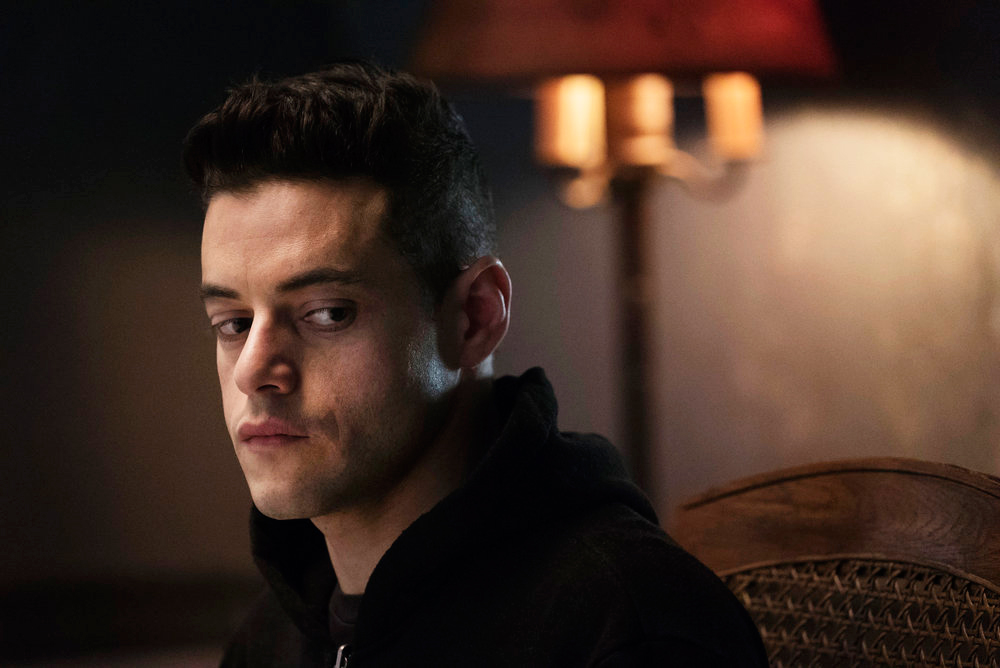
The season 2 finale of Mr. Robot, airing next Wednesday night, has a great deal of narrative work to do. It needs to explain, at least a little, where Tyrell Wellick (Martin Wallström) has been. It needs to show us more about how Elliot’s “Mr. Robot” alter personality takes him over and what the consequences of this are; we’ve seen too many hints that Elliot himself becomes a world-changing mastermind in moments he cannot remember, and not enough plot movement. It doesn’t need to tie together its various dark actors (who have thus far seemed vaguely and ineffably connected) but it does need to point towards a less scattered way forward.
That’s only a part of my list; if you’re a fan of the show, you probably have your own. And while I don’t generally think shows “need” to do anything but follow their own star—after all, they don’t owe me anything—it’s hard not to get a bit prescriptive about a show that so consistently ignores TV’s little satisfactions in favor of a bigger goal that’s, right now, far from view. Mr. Robot has, for the bulk of its season, done many things very well, but fulfilling the imperatives of once-a-week television drama has not been one of them. The amount of weight that the show’s finale has to bear in order to justify and retroactively explain the season’s ditherings so far is almost too much.
The show has, this season, been supremely confident that its core audience will stick with it through a narrative unfolding that hasn’t just been slow—it’s, at times, doubled back on itself. I’ve given up on a retroactive justification for the too-long (by at least two episodes) period during which Elliot (Rami Malek) was incarcerated and fantasizing that he lived with his mother, other than the show testing out its wings. And Angela (Portia Doubleday), having spent much time considering becoming a whistleblower seems, now, to have decided against it in order to stay safe, having been kidnapped and threatened with death by Whiterose (B.D. Wong). Or maybe she was recruited by Whiterose, who told her about an overarching conspiracy that took out her and Elliot’s parents for the greater good of humanity. What are her motives—and is Whiterose telling the truth? You choose!
I believe, if more tepidly now than weeks ago, that when Mr. Robot concludes its run it will have told whatever is finally its story in a satisfying way. I have to believe that to keep on going with it, because it looks so little like many shows I see as less artfully made but that I enjoy more, ones that measure narrative pleasure in the short as well as the long run. To watch Mr. Robot in its second season was to feel fundamentally unserious; being left wanting not “more” but just “something” with regard to meaningful, understandable narrative development is uncomfortable. Every move made—whether at Angela’s job, or in Elliot’s twisted mind, or in the vaguely drawn plotlines about the Chinese government and the Dark Army—was freighted with import, but not import that had any actual meaning to the viewer—at least not yet. A sense of foreboding and an air of mystery only goes so far. Eventually you need to back your confidence up.
This is a show built for the streaming era—a viewer who can, Elliot-like, pull a hoodie over his head and dial into the show for a sleepless, mania-inducing stretch will see connections more easily and get where the show is going far more quickly. The weeklong barriers between individual units of Mr. Robot will eventually be erased. But as the show is unfolding week-in and week-out on USA, it’s not working. The show can’t succeed, as a traditional TV show, if individual episodes don’t move the ball forward.
To the show’s credit: We’ve seen, in intriguing and sparely drawn detail, what the world at large looks like after the collapse of the economy. And we’ve learned a great deal more about the savage capabilities of various supporting characters, from the careerist and ultimately self-preserving Angela to the actual killer Darlene (Carly Chaikin) to, in perhaps one of my favorite developments of this season, the three-dimensional chess player Joanna (Stephanie Corneliussen).
Their performances, in the fullness of time, will likely be appreciated all the more by viewers who continue to press “play next episode” in order to watch a maxi-movie about their adventures. But viewers today are left to try to extract meaning from truncated bits of performance, as in Wednesday night’s brief shot of Joanna announcing she’s received “the greatest” gift from her absent husband Tyrell. Sitting down each week to watch them has gotten tougher and tougher to do, knowing as I do that their individual exploits will be fun but that I’m unlikely to get even a glimmer of satisfaction as to where they all fit into whatever is the show’s story. In Wednesday night’s episode, Whiterose, having kidnapped Angela, gives her 28 minutes of conversation; the mastermind measures time by the minute and deems this generous. It felt like a pointed reminder of quite how much of my own time I’d invested into a show that, right now, is taking it for granted.
More Must-Reads From TIME
- The 100 Most Influential People of 2024
- The Revolution of Yulia Navalnaya
- 6 Compliments That Land Every Time
- What's the Deal With the Bitcoin Halving?
- If You're Dating Right Now , You're Brave: Column
- The AI That Could Heal a Divided Internet
- Fallout Is a Brilliant Model for the Future of Video Game Adaptations
- Want Weekly Recs on What to Watch, Read, and More? Sign Up for Worth Your Time
Contact us at letters@time.com